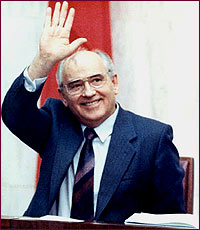 Mikhail
Gorbachev Mikhail
Gorbachev
In 1985, when the first rumblings of Gorbachev's thunder
disturbed the moldy Soviet silence, the people who always gather
at flea markets and around churches - predicted that the new
leader would rule seven years. They assured anyone interested
in listening that Gorbachev was "foretold
in the Bible," that he was an apocalyptic figure:
he had a mark on his forehead. Everyone had searched for signs
in previous leaders as well, but Lenin's speech defect, Stalin's
mustache, Brezhnev's eyebrows and Khrushchev's vast baldness
were utterly human manifestations. The unusual birthmark on
the new General Secretary's forehead, combined with his inexplicably
radical actions, gave him a mystical aura.
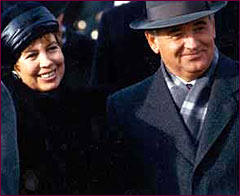 Mikhail
Gorbachev was born in the village of Privolnoye near Stavropol,
Russia. From the age of 13 he worked on a collective farm, where
his father was a mechanic. Mikhail
Gorbachev was born in the village of Privolnoye near Stavropol,
Russia. From the age of 13 he worked on a collective farm, where
his father was a mechanic.
He was an exceptional student and earned a law degree
at Moscow University where he joined the Communist party and
became Secretary of the law department's Young Communist League.
After returning to the Stavropol area he rose in the League
hierarchy to become Regional Secretary of the League, and in
1961 first became a delegate to the Party Congress. He spent
the 1960s working his way up through the territorial bodies
of the Party and continuing his education in agronomy and economics.
As an agricultural administrator and party leader in his
native region, he acquired a reputation for innovation and incorruptible
honesty, and he soon rose in the Party hierarchy. He was first
elected to the Supreme Soviet in 1970, and served on commissions
dealing with conservation, youth policy, and foreign affairs.
In 1971 he was elected to the Central Committee. In 1978 he
became First Secretary of the Stavropol territorial committee
and by 1980 was a full member of the Politburo.
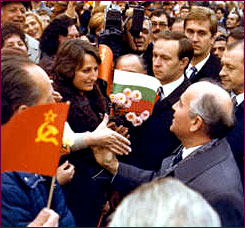 The
death of the long-time General Secretary of the Communist
Party, Leonid Brezhnev, presented a brief opportunity for
change in the Soviet Union. Brezhnev's successor, Yuri Andropov,
appeared to be grooming Gorbachev as his own successor, but
after Andropov's unexpected death, Gorbachev was passed over
for the top spot and the aged Konstantin Chernenko came to
power. When Chernenko too died barely a year after taking
power, it was at last clear to the Party hierarchy that younger
leadership was needed and Gorbachev became General Secretary.
Gorbachev's main opposition, Gryshin, was removed and replaced
by Boris Yeltsin in December 1984. He was ready to make long
overdue reforms in the Soviet system. The
death of the long-time General Secretary of the Communist
Party, Leonid Brezhnev, presented a brief opportunity for
change in the Soviet Union. Brezhnev's successor, Yuri Andropov,
appeared to be grooming Gorbachev as his own successor, but
after Andropov's unexpected death, Gorbachev was passed over
for the top spot and the aged Konstantin Chernenko came to
power. When Chernenko too died barely a year after taking
power, it was at last clear to the Party hierarchy that younger
leadership was needed and Gorbachev became General Secretary.
Gorbachev's main opposition, Gryshin, was removed and replaced
by Boris Yeltsin in December 1984. He was ready to make long
overdue reforms in the Soviet system.
For six years Gorbachev carried off a delicate balancing
act, forcing reforms on a recalcitrant old guard, while trying
to contain the demand for change from radical reformers within
and without the Communist Party. He permitted an unprecedented
freedom of expression in the USSR and ended the disastrous
Soviet military involvement in Afghanistan.
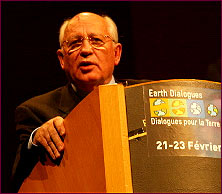 By
1989 the demand for reform had spread to the Soviet satellite
states of Central Europe. Gorbachev notified the Communist
leaders of those coutries that he would not intervene militarily
to keep them in power as his predecessors had done. Without
the support of the Red Army, these dictatorships were quickly
forced to yield to their democratic opposition, and Gorbachev
began the withdrawal of the remaining Soviet forces from Central
Europe. In 1990 he was awarded the Nobel Peace Prize for
his foreign policy initiatives. By
1989 the demand for reform had spread to the Soviet satellite
states of Central Europe. Gorbachev notified the Communist
leaders of those coutries that he would not intervene militarily
to keep them in power as his predecessors had done. Without
the support of the Red Army, these dictatorships were quickly
forced to yield to their democratic opposition, and Gorbachev
began the withdrawal of the remaining Soviet forces from Central
Europe. In 1990 he was awarded the Nobel Peace Prize for
his foreign policy initiatives.
Gorbachev continued to press for democratization in
the Soviet Union and permitted free elections in Russia and
the other republics of the Soviet Union. He survived an attempted
coup by Communist hardliners in 1991 but relinquished office
after the elected presidents of the constituent republics
undertook to replace the old Soviet Union with a Confederation
of Independent States.
Since leaving office, he has continued to advocate
the development of private ownership in a market economy,
and the non-violent resolution of conflicts in a democratic
society. He is President of the International Foundation for
Socio-Economic and Political Studies, known as the Gorbachev
Foundation, which conducts political and economic research,
and promotes international exchange, and a President of the
Green Cross International.
"We need a new system of values,
a system of the organic unity between mankind and nature and
the ethic of global responsibility" - Mikhail
Gorbachev.
He ran for the Presidency in 1996 but only received
1% of the vote. He is considered as having been a negative
part of Russia's history.
He is recognized around the world as one of the most influential
statesman of the 20th century.
|

|
August
Coup
August Coup (Aug. 18–22, 1991) was attempted against Soviet
President Mikhail Gorbachev. On the eve of the signing ceremony
for a new union treaty for the Union of Soviet Socialist Republics,
members of the Politburo and the heads of the Soviet military
and security services detained Gorbachev at his villa in the
Crimea. Claiming that Gorbachev had been removed from his position
as president due to illness, the leaders of the coup formed
an eight-man Committee of the State of Emergency and attempted
to assume control of the government. Russian parliamentarians,
under the leadership of Boris Yeltsin, led popular resistance
to the Committee's leadership. Soldiers and tanks sent to arrest
Yeltsin found the Russian Parliament building surrounded by
both armed and unarmed civilians. The soldiers then turned around,
either returning to their barracks or joining the resistance.
Many junior officers and officials in the Moscow ministries,
as well as the leadership of the Soviet Union's constituent
republics, denounced the new leadership. The coup collapsed
as the Committee found itself lacking either the will or the
loyalty of the military necessary to put down the burgeoning
resistance movement. Gorbachev was released from detention and
flown to Moscow. Real power in Russia, however, had devolved
to Yeltsin, who used the coup's failure to eliminate the political
power of the Communist party of the Soviet Union. The August
Coup resulted in a minimal loss of life (3 deaths in Moscow
and 3 in the Baltic States), the end of the Communist party
dominance, and hastened the disintegration of the Soviet Union.

|
 |
|
|
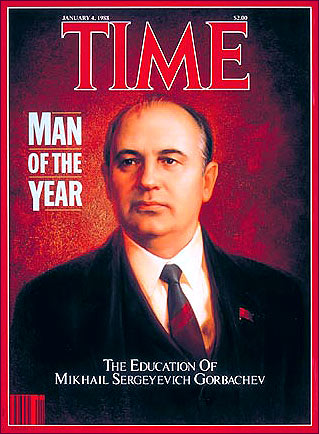
Time magazine cover of January 4,
1988 featuring Mikhail Gorbachev as Man of the Year.
|

|
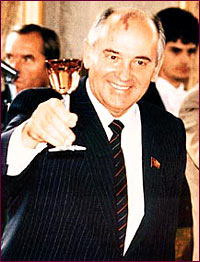 The
most noteworthy of Gorbachev's actions as a head of the USSR
were his broad agricultural reforms and, of course, Perestroika,
a broad "restructuring" of the Soviet socialist system. The
most noteworthy of Gorbachev's actions as a head of the USSR
were his broad agricultural reforms and, of course, Perestroika,
a broad "restructuring" of the Soviet socialist system.
The Russian people and the old Soviet regimists were
unhappy with some of Gorbachev's policies. Perestroika, although,
a novel idea did not bring about the changes promised. Throw
in the Chernobyl disaster in 1986, the Vietnam-like incident
in Afghanistan in 1987 and the Coal Miner's Strike in Siberia
in 1987 and you've got one volatile situation.
|
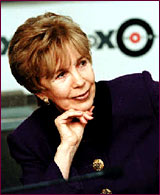 Aside
from being awarded the Nobel Prize, 1990 was the beginning of
the end of Gorbachev's reign and with him the whole Soviet Union
as the world knew it then. Aside
from being awarded the Nobel Prize, 1990 was the beginning of
the end of Gorbachev's reign and with him the whole Soviet Union
as the world knew it then.
In 1989 the Berlin Wall, separating Communist controlled
East Germany from the West, came down and Soviet presence in
that area was forced to pull out. Today this is looked at as
the beginning of the end for the Soviet Era.
|
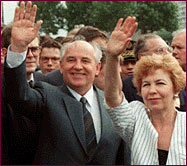 Unrest
in the USSR itself also led to this end. In March of 1990, Lithuania
declares it's independence from the Soviet Union. Gorbachev
is also elected president (a new office) of the USSR in that
month. The political unrest which had begun back when Gorbachev
had taken office continued to increase and Gorbachev was forced
to reorganize the upper pylon of officials. Unrest
in the USSR itself also led to this end. In March of 1990, Lithuania
declares it's independence from the Soviet Union. Gorbachev
is also elected president (a new office) of the USSR in that
month. The political unrest which had begun back when Gorbachev
had taken office continued to increase and Gorbachev was forced
to reorganize the upper pylon of officials.
|
 Right
after his election, he created the Soviet of the Federation
and the President's Council. The President's Council was dissolved
later that year along with the Soviet of Ministers which was
replaced with the Cabinet of Ministers. The role of the Soviet
of the Federation was also changed at this time. In the beginning
of 1991, more unrest in the Baltic States continued causing
more and more crackdowns from Gorbachev but his power seemed
to be waining. Right
after his election, he created the Soviet of the Federation
and the President's Council. The President's Council was dissolved
later that year along with the Soviet of Ministers which was
replaced with the Cabinet of Ministers. The role of the Soviet
of the Federation was also changed at this time. In the beginning
of 1991, more unrest in the Baltic States continued causing
more and more crackdowns from Gorbachev but his power seemed
to be waining.
In August 1991, Gorbachev was kidnapped from his vacation
home near the Black See. The coup released him 2 days later
as the attempted coup seemed to have failed.
|
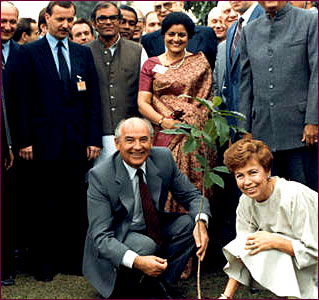
In December of that year, however, Gorbachev resigned
as President and the USSR ceased to exist. Boris Yeltsin took
control of the new democratic government. |

|
Links
To learn mora about Gorbachev visit Gorbachev
- My First Day on the Job, Gorbachev's
Legacy, Gorbachev
Wins Nobel Peace Prize, (in English), Gorbachev's
official site, jokes
about Gorbachev (in Russian)
|
|
|



